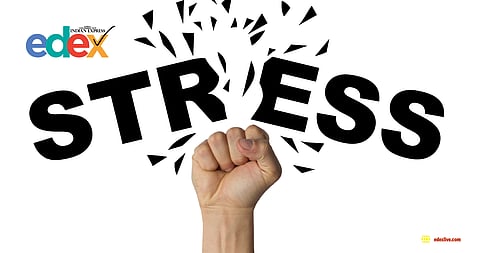

Feeling overwhelmed, anxious or drained? Looks like you are experiencing stress. It’s how you respond to various situations and challenges that affect your well-being. Common stress triggers include work/academic pressures, relationship issues, financial difficulties and major life changes.
When faced with a stressful situation, the body activates the nervous system and boosts the production of hormones like cortisol.
There are different kinds of stress people face in their lives:
Acute stress
Short-term stress in response to immediate threats or challenges such as deadlines, exams or emergencies.
Chronic stress
Long-term stress that persists over an extended period, often due to ongoing issues like financial struggles, relationship problems, or work-related ones.
Episodic acute stress
Frequent episodes of acute stress, often triggered by specific situations or events such as public speaking or meeting deadlines.
Traumatic stress
Intense stress resulting from experiencing or witnessing traumatic events, such as natural disasters, abuse, or accidents.
Eustress
Positive stress that motivates and energises.
Distress
Negative stress that can harm physical and mental health, such as anxiety, burnout or overwhelm.
Stress can negatively impact our physical and mental health leading to:
Sleep problems, loss of concentration, procrastination, neglecting responsibilities, depression, unhappiness, ineffective decision-making, irritability and a sense of loneliness.
Physical symptoms like muscle tension, changes in appetite, shortness of breath, nausea, poor judgment, pessimistic attitude, anxious thoughts, high blood pressure, digestive issues, weakened immune system etc.
How to reduce stress
Avoid unnecessary stress
Oftentimes, stress comes from the things that do not really have to be stressful. We become frustrated and tired because we try to control and do everything at once. The key here is to choose the right battles. Take control by avoiding things and people that can stress you out. Knowing your priorities will help avoid unnecessary stressors. Invest your energy in what matters.
Express what you feel
Opening yourself up is a way of de-stressing. Be more expressive and assertive. Your friends, family or a counsellor can listen to you. Writing out your feelings will be helpful in releasing pent-up emotions and stress.
Make time for fun and relaxation
Reward yourself after you’ve accomplished a task that has caused you a lot of stress. Spend time with friends, connect with other people, and do fun things together. It is equally necessary to incorporate humour into social interactions. Take these times as chances to breathe in fresh air and loosen up.
Adopt a healthy lifestyle
Remain healthy, as the body needs strength and energy to compete with stressors we face every day. Treat the body right by exercising regularly, eating healthy, reducing sugar and caffeine intake, and getting enough sleep.
Exercise
Exercise benefits the mind just as much as the body. Natural painkillers called endorphins are also released during exercise. They are responsible for reducing depression and anxiety.
Rest
Sleep and napping give the body the proper reboot it needs, especially after surviving a very stressful day. If you find it hard to sleep, keep a diary. Take a few minutes before bedtime to write down the things you worry about.
Music and sound
Studies have shown that the most effective stress reducing sounds are those recordings from nature like the chirping birds, the swish of the wind, rainfall, and the sounds of the ocean waves.
Meditate
Take ten or twenty minutes from your schedule to sit in a corner silently. Enjoy the silence. Take deep breaths while doing so.
Make your goals smarter
We are most stressed out when expectations fall short, our goals unachieved. Do it SMARTER: Specific, Measurable, Attainable, Realistic, Timebound, Exciting, and Realistic.
Manage your time
Manage what little time you have. Divide your time accordingly. Set aside things for tomorrow. Do not squeeze everything into one day.
Look for a hobby
Try out new things or pursue your interests. When you’ve spent so much time working, a hobby is a great way to release stress.
Imagine
Aside from meditation, imagining can also give you an escape from stressful situations and make your senses relax.
(By Nada Shareen. The writer is a Psychologist / Behaviour Therapist at Speechshore.)
